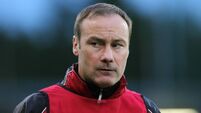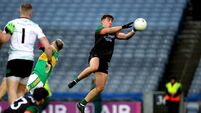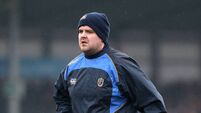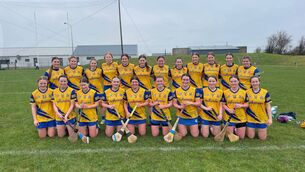‘It was do or die at that stage’
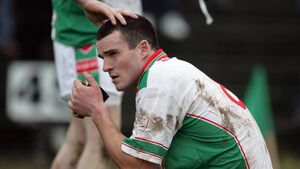
NOT OUR DAY: A dejected Mark O'Carroll following St. Brigid's narrow loss to Ballina Stephenites in the 2007 Connacht Club Senior Football Championship final, which denied the South Roscommon club back-to-back titles for the first time in their history.
Of all the games that Mark O’Carroll played in, it’s the 2007 Connacht final loss against Ballina Stephenites that he “thinks about the most”.
A year earlier, he had single-handedly pulled St. Brigid’s back from the cliff-edge, inspiring the infamous comeback against Corofin, which led to Karol Mannion’s spectacular injury-time goal and the club’s maiden provincial title.
But 2007 will always be remembered as the one that got away. With St. Brigid’s two points down in the fourth minute of injury time on a filthy day in North Mayo, Peter Domican’s long delivery was gathered by O’Carroll.
Once he rode the first challenge, he was through, only for the width of the crossbar to deny Brigid’s what would probably have been a dramatic winning goal, and back-to-back Connacht club crowns.
“It was do or die at that stage. In my mind, once I got by the first defender, I was never in doubt — I was going for it. I suppose when you look back on it, I had support. I could have laid it off to Karol (Mannion) on my right.
“But it opened up for me. You break a tackle and you literally have a split second to make up your mind. By the time I gathered myself, I was through on goal and went for it. I never felt that it was in doubt until I heard that sound of the ball coming back off the crossbar.
“Now, I look back on it as a mistake. At the time, it’s not a mistake until the ball doesn’t hit the net. It was a cruel lesson in terms of composure. You can’t teach that to someone, you have to go through it.
“But we should never have been in that position in the first place. We had enough ball to win the match,” he recalled.
As the clubs prepare to renew acquaintances for the first time since then in King and Moffatt Dr. Hyde Park on Sunday next, O’Carroll has learned to live with that disappointment. Married and now living in Tubberlclair outside Athlone with his wife Brona and three young children — Lucy, Tom and Conor — life has given him perspective.
But 18 years ago, beating Ballina was the only thing on his radar. St. Brigid’s, as defending champions, had just beaten Killererin in the Connacht semi-final and confidence, — under current manager Anthony Cunningam who was at the helm between 2006 and 2008 — wasn’t in short supply heading into the lion’s den of Ballina.
“It was a tough day. Arriving in the place, you could see that conditions weren’t good. It was going to suit a more experienced kind of team.
“We were going down to win the game. We were in great form. We were full of confidence. Our tails were up, and we felt that we had a serious chance to retain our title.”
But a Ballina team featuring the Bradys, Ronan McGarrity, among others, made a lightning start, scoring a goal inside a minute and adding another three-pointer before the half-time whistle. They were subsequently reduced to 14 men in the second half, but Brigid’s couldn’t engineer enough momentum to make their numerical superiority count.
“We had put in a huge shift in the opening half but we were still four points down at half time. We had expended a lot of energy trying to stay in the game. But there were no alarm bells going off.
“We came out at the start of the second half and kicked a few scores like we planned. People always refer to the chance I had but when they had a man sent off, we just couldn’t capitalise on it. That’s where we lost the game.
“They just took the momentum out of the game, and they did it brilliantly. That’s what an experienced team would have done. They slowed it down completely and actually went a few more scores ahead. It was a killer.
“We had been in the same position against Corofin the year before, and we managed to dig it out. But frustration was the main feeling afterwards. We had enough possession to win the game comfortably but we gifted them two goals in the first half,” he bemoaned.
Having competed in three Connacht finals in succession, that defeat kickstarted two years of disappointment as Brigid’s were knocked out of the Roscommon championship by Western Gaels and St. Aidan’s respectively in 2008 and 2009.
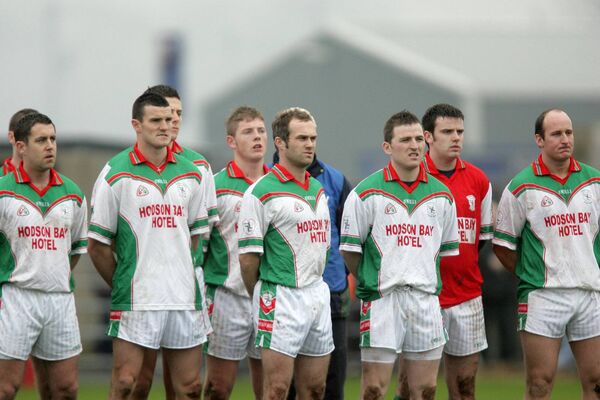
Replenished minds and bodies returned for 2010, but O’Carroll never made it to that year’s championship after suffering a horrific knee injury in the opening seconds of Roscommon’s Connacht championship game against London in Ruislip.
O’Carroll suffered a tibial plateau fracture where the top of his shin bone split. He wouldn’t see meaningful action again for another three years.
“The problem was that I was pushing too hard (to return from injury). The club was going well and you desperately want to be part of it. Roscommon were going well at the time. I was really starting to enjoy my football again,” he highlighted.
When he returned from a nine-month stint in Australia in Christmas 2012, he was in decent shape. He had intended to spend two weeks at home and return to Oz, but a chat with Kevin McStay changed his plans.
“I had been playing Australian Rules, so I was fairly fit. But I was probably more important to the group. I was never fit enough to compete in 2013. I suppose Kevin just wanted characters in the dressing room.”
After St. Brigid’s All-Ireland triumph, O’Carroll was back in the team for the 1-13 to 0-9 victory against Western Gaels in the county final later that year. He came on in the subsequent Connacht final loss against Castlebar Mitchels in the Hyde but, by his own admission, his knee had “blown out” at that stage.
Looking ahead to Sunday’s rematch in the Hyde, O’Carroll has nothing but admiration for a group of players that, in the former midfielder’s words, are probably “more level-headed” than the panel he played with.
“The game has changed so much. It’s such a young Brigid’s team, probably with a younger profile than we had between 2005 and 2007.
“They have some unbelievably cool heads. They’re not a big, physical team, but they’re a team of footballers. They play the game the way it should be played. Honestly, you couldn’t meet a nicer group of lads,” he concluded.
Like Mark O’Carroll in his prime, he’s backing them to do their talking on the pitch.
